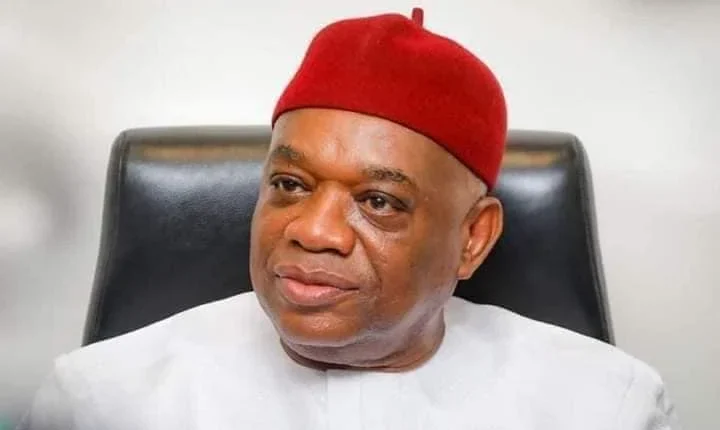Kalu’s Attack on Nnamdi Kanu Draws U.S. Group’s Reproach
A United States–based advocacy organisation, The Rising Sun Group, says Senator Orji Uzor Kalu’s recent commentary on the detained IPOB leader, Mazi Nnamdi Kanu, is less about national security and more about political signalling as the 2027 election cycle quietly begins to take shape.
In a statement issued Wednesday, the group said Kalu’s sudden eagerness to speak harshly about Kanu—especially on prime-time television—should be read in the context of his shifting political alliances and his attempt to reposition himself after “years of fluctuating loyalties.”
Kalu had claimed on Channels Television that more than 30,000 people had died as a result of IPOB-related agitation, a figure the group described as “inflated, unverified, and politically convenient.” He also defended Justice James Omotosho, the Federal High Court judge whose ruling led to Kanu’s conviction and life sentence—an outcome that has drawn criticism both at home and abroad.
According to The Rising Sun Group, the real issue is not Kalu’s tone but why he is talking now.
“Instead of reflecting deeply on the implications of the judgement, Senator Kalu chose this moment to take cheap shots at Nnamdi Kanu,” the group said. “This is not accidental political behaviour; it is calculated.”
The organization argued that Kalu’s comments align with a broader pattern seen among some political figures seeking to strengthen their relationship with President Bola Tinubu after previously opposing him.
“Kalu campaigned against Tinubu in 2023. Nigerians know this,” the statement read. “His new enthusiasm is simply a public audition.”
The group dismissed Kalu’s suggestion that he helped secure Kanu’s release in 2017, saying the senator was attempting to “insert himself into history” to appear more relevant to both the Presidency and the Southeast.
“It is a familiar script: when cornered politically, reinvent the past and raise the volume,” the statement said.
They also questioned Kalu’s comparison of his own corruption trial to Kanu’s ordeal, describing it as “a false equivalence designed to sanitize his past while delegitimizing Kanu’s struggle.”
But perhaps the statement’s most pointed challenge was its question on Kalu’s claim of “30,000 deaths.”
“If 30,000 people were killed, who ordered these killings?” the group asked. “Or is the senator referring to the documented cases where security forces opened fire on unarmed IPOB supporters in Nkpor, Onitsha, Aba, and Port Harcourt?”
By putting the burden of proof on Kalu, the group reframed the debate—from whether Kanu’s agitation caused violence to whether the state’s response itself demands scrutiny.
For The Rising Sun Group, Kalu’s remarks are part of a deeper regional concern: the feeling that certain Southeast politicians “weaponize the pain of their people” to score points in Abuja.
“Every election cycle produces new opportunists,” the group said. “Those who think the suffering of their people can be exchanged for favour will face the verdict of history.”
The organization urged Kalu to “stop testing the patience of Ndigbo” with what it called “ill-timed, ill-intentioned attacks” on a man currently facing a life sentence.
If you’d like, I can also create a more investigative-style version, a more dramatic newspaper front-page version, or a tighter 5-paragraph newswire version.

